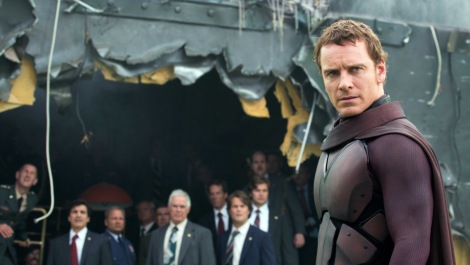X-Men: Days Of Future Past

Overcrowding is a killer for comic-book movies. This summer’s The Incredible Spider-Man 2 became the latest superhero broth to be spoiled by too many cooks (read: villains), and even Marvel, who have built an empire around an ensemble, largely stick to beefing up solo movies with potent supporting players rather than regular group efforts.
The announcement, then, that Bryan Singer was returning to the X-Men franchise bringing more or less his entire original cast with him was met with an appropriate mix of excitement and trepidation. Of course we all want to see the young blood of First Class thrown into the mix with Patrick Stewart, Ian McKellen and their fellow original mutants, but putting a foremost cast of more than ten players in the hands of scriptwriter Simon Kinberg, whose last X-effort was The Last Stand, felt like dodgy ground.
What Singer and Kinberg have ultimately pulled off is an almost mutant-like feat of blockbuster engineering, pulling together a slew of emotional character arcs, mythologybuilding and outlandish spectacle into a witty, elegant and coherent whole.
That’s not to say that Days Of Future Past isn’t unwieldy. Its opening moments are frankly worrying, with Stewart’s Xavier intoning ponderous exposition as he convenes with Kitty Pryde (Ellen Page), Magneto (McKellen) and Storm (Halle Berry) amid a terrible, war-torn future. Mutants and their human supporters are being exterminated by the super-strong automatic Sentinels – and the X-Men’s only hope for their future is to stop this reality before it starts.
Enter Wolverine (Hugh Jackman), who’s sent back in time to 1973 to prevent the string of events that leads to the Sentinels’ creation, and reminds us in the process why he was the franchise’s original breakout character. In place of the po-faced angst that bogged down both his standalone movies, Jackman gets to be roguish and sarcastic again here, playing the wryly incongruous role of reluctant motivational speaker to James McAvoy’s jaded young Xavier. It’s no coincidence that Wolverine hasn’t been this entertaining since the last time Singer was calling the shots.
But while there’s an overall commitment to character, many of the individual cast end up shortchanged by Kinberg’s scattershot script. McAvoy does gorgeous, simmering work as the formerly serene Xavier, reeling from the triple-whammy of losing BFF Magneto (Michael Fassbender), surrogate sister Mystique (Jennifer Lawrence), and the use of his legs. But neither one of those core relationships gets the screen time it should, with the propulsive Xavier/Magneto dynamic that made First Class so compelling largely sidelined. McAvoy and Fassbender get a release splendid scene together, as do Stewart and McKellen, but overall this feels like a missed opportunity to further utterly the relationship’s homoerotic depths.
It’s no shock that Lawrence’s screen time has been beefed up to reflect her stratospheric career rise since First Class (she even steals the DOFP extras package, repeatedly cracking up shooting the kitchen sequence when Singer, his voice falsetto due to an ulcer, directs like Mickey Mouse on helium). Still, even J-Law can’t conjure miracles.
While it’s Mystique’s solo vengeance mission against villainous scientist Bolivar Trask (Peter Dinklage) that threatens the future of the mutant race, she’s a cipher whose inner life we never get to see. Her relationship with Charles has no weight at all, which diminishes the impact of the third act’s endearing conclusion about having faith in those you like.
Magneto’s motivations are desperately muddled too, pivoting entirely on off-screen events that we only hear about in passing, so that Fassbender’s performance becomes more straightforwardly cold than the nuanced torment he played so magnetically (if you will) in First Class.
But despite its dark and desolate premise, the film is gloriously light on its feet – making up for its lack of emotional detail in expertly calibrated fun. The heist-like plot to break Magneto out of high-security prison is a pure joy, with the prankish introduction of Quicksilver (Evan Peters) leaving future Avenger Aaron Taylor-Johnson with some very sizeable shoes to fill. The much-discussed slo-mo sequence in which he casually uses his super-speed to defuse an entire Pentagon security force is probably the most creative and amusing standalone sequence in the entire franchise.
With Halle Berry’s Storm barely on-screen and Anna Paquin’s Rogue reduced to a cameo, this isn’t quite the seamless blend of past and present that fans might want, and it’s undeniably less thoughtful than previous X-chapters. But the sense of real like for its characters is palpable, and Singer deploys the outlandish spectacle sparingly enough to avoid set-piece fatigue: see Magneto levitating a baseball stadium to use as a barricade around the White Household.
In rehabilitating Wolverine and developing McAvoy’s broken Xavier towards Stewart’s older incarnation, DOFP reinvigorates the franchise and lays strong groundwork for the upcoming Apocalypse. It’s an imperfect but invigorating ride, a time travel epic-cum-caper movie with its heart firmly in the right place.
![]()












